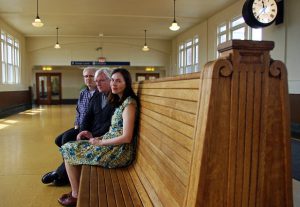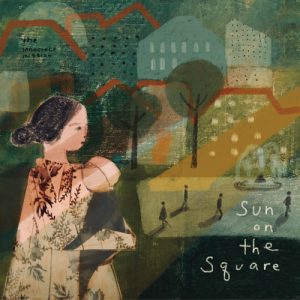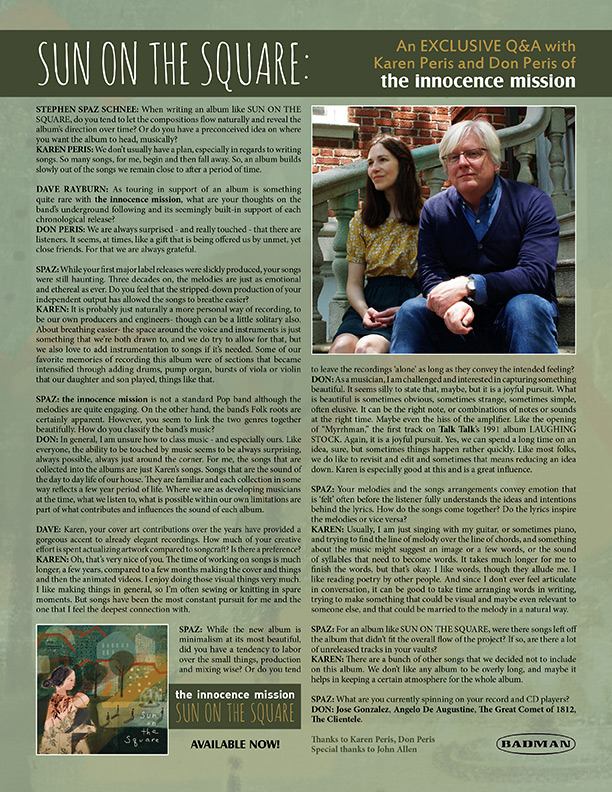SPAZ: When writing an album like SUN ON THE SQUARE, do you tend to let the compositions flow naturally and reveal the album’s direction over time? Or do you have a preconceived idea on where you want the album to head, musically?
KAREN PERIS: We don’t usually have a plan, especially in regards to writing songs. So many songs, for me, begin and then fall away. So, an album builds slowly out of the songs we remain close to after a period of time.
DAVE RAYBURN: As touring in support of an album is something quite rare with the innocence mission, what are your thoughts on the band’s underground following and its seemingly built-in support of each chronological release?
DON PERIS: We are always surprised – and really touched – that there are listeners. It seems, at times, like a gift that is being offered us by unmet, yet close friends. For that we are always grateful.

SPAZ: While your first major label releases were slickly produced, your songs were still haunting. Three decades on, the melodies are just as emotional and ethereal as ever. Do you feel that the stripped-down production of your independent output has allowed the songs to breathe easier?
KAREN: It is probably just naturally a more personal way of recording, to be our own producers and engineers- though can be a little solitary also. About breathing easier- the space around the voice and instruments is just something that we’re both drawn to, and we do try to allow for that, but we also love to add instrumentation to songs if it’s needed. Some of our favorite memories of recording this album were of sections that became intensified through adding drums, pump organ, bursts of viola or violin that our daughter and son played, things like that.
SPAZ: the innocence mission is not a standard Pop band although the melodies are quite engaging. On
the other hand, the band’s Folk roots are certainly apparent. However, you seem to link the two genres together beautifully. How do you classify the band’s music?
DON: In general, I am unsure how to class music – and especially ours. Like everyone, the ability to be touched by music seems to be always surprising, always possible, always just around the corner. For me, the songs that are collected into the albums are just Karen’s songs. Songs that are the sound of the day to day life of our house. They are familiar and each collection in some way reflects a few year period of life. Where we are as developing musicians at the time, what we listen to, what is possible within our own limitations are part of what contributes and influences the sound of each album.
DAVE: Karen, your cover art contributions over the years have provided a gorgeous accent to already elegant recordings. How much of your creative effort is spent actualizing artwork compared to songcraft? Is there a preference?
KAREN: Oh, that’s very nice of you. The time of working on songs is much longer, a few years, compared to a few months making the cover and things and then the animated videos. I enjoy doing those visual things very much. I like making things in general, so I’m often sewing or knitting in spare moments. But songs have been the most constant pursuit for me and the one that I feel the deepest connection with.

SPAZ: While the new album is minimalism at its most beautiful, did you have a tendency to labor over the small things, production and mixing wise? Or do you tend to leave the recordings ‘alone’ as long as they convey the intended feeling?
DON: As a musician, I am challenged and interested in capturing something beautiful. It seems silly to state that, maybe, but it is a joyful pursuit. What is beautiful is sometimes obvious, sometimes strange, sometimes simple, often elusive. It can be the right note, or combinations of notes or sounds at the right time. Maybe even the hiss of the amplifier. Like the opening of “Myrrhman,” the first track on Talk Talk’s 1991 album LAUGHING STOCK. Again, it is a joyful pursuit. Yes, we can spend a long time on an idea, sure, but sometimes things happen rather quickly. Like most folks, we do like to revisit and edit and sometimes that means reducing an idea down. Karen is especially good at this and is a great influence.
SPAZ: Your melodies and the songs arrangements convey emotion that is ‘felt’ often before the listener fully understands the ideas and intentions behind the lyrics. How do the songs come together? Do the lyrics inspire the melodies or vice versa?
KAREN: Usually, I am just singing with my guitar, or sometimes piano, and trying to find the line of melody over the line of chords, and something about the music might suggest an image or a few words, or the sound of syllables that need to become words. It takes much longer for me to finish the words, but that’s okay. I like words, though they allude me. I like reading poetry by other people. And since I don’t ever feel articulate in conversation, it can be good to take time arranging words in writing, trying to make something that could be visual and maybe even relevant to someone else, and that could be married to the melody in a natural way.
SPAZ: For an album like SUN ON THE SQUARE, were there songs left off the album that didn’t fit the overall flow of the project? If so, are there a lot of unreleased tracks in your vaults?
KAREN: There are a bunch of other songs that we decided not to include on this album. We don’t like any album to be overly long, and maybe it helps in keeping a certain atmosphere for the whole album.
SPAZ: What are you currently spinning on your record and CD players?
DON: Jose Gonzalez, Angelo De Augustine, The Great Comet of 1812, The Clientele.
Thanks to Karen Peris and Don Peris
Special thanks to Dave Rayburn and John Allen

the innocence mission
SUN ON THE SQUARE
Available NOW!
